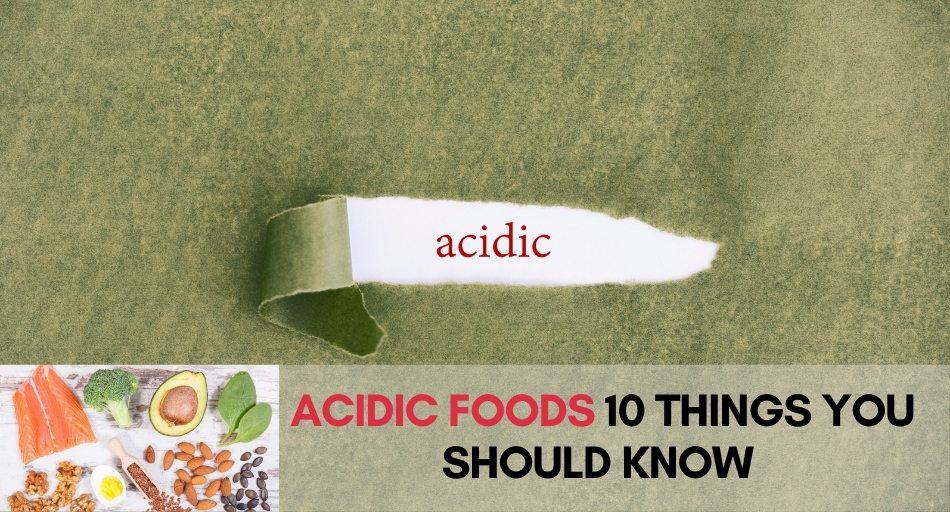Acidic foods get a bad rep these days. Many people attribute acid reflux, inflammation, and stomach problems to this food type. But not many of us actually know if there's some truth to those claims.

If you've ever looked up acidic and alkaline foods, you definitely realized that most commonly consumed foods are actually acidic. So, should we all completely change our diets? Are acidic foods that bad for us?
Acidic foods are often linked with acid reflux and GERD, but also other health conditions. But is it fair to lump a large number of foods together and call them unhealthy? Let's take a look at all you should know about acidic foods and debunk some myths.
Here are 10 acidic foods answers you should know.
Table of Contents
- 1. What are acidic foods?
- 2. Does a low pH level make the food acidic?
- 3. Are acidic foods bad for my health?
- 4. What are some of the most acidic foods?
- 5. Do acidic foods affect my body's acidity?
- 6. Can I eat acidic foods on acid reflux?
- 7. Can acidic foods damage my teeth?
- 8. Does eating acidic foods lead to inflammation?
- 9. Do acidic foods cause weight gain?
- 10. Do acidic foods all taste sour?
1. What are acidic foods?
Acidic foods are foods that leave acidic ash after they're metabolized and digested by your body. Many people believe that these foods cause inflammation and may even lead to various chronic conditions. Most of us consume a lot of acidic foods, though, without even knowing.
Our diets are based on meat, processed foods, and sugary products, which are all acid-forming. Luckily, most of us don't have issues with these foods, and we can continue eating them as long as they're part of a healthy, balanced diet.
2. Does a low pH level make the food acidic?
This is something many people believe but isn't true: Foods don't have to have a low pH level to be acidic. In the same sense, foods with a low pH level don't have to be acidic. The effect the foods you eat have on your body depends on the mineral ash that the food leaves after it's digested and metabolized by your body.
To illustrate that, let's have an example. Orange has a pH level of around 3.69, while noodles have a pH level of around 6.50. In this example, you might think that oranges are an acidic food, but that's not true: Oranges are actually alkaline-forming, but noodles are acidic. So, simply looking up the pH level of the food that you eat doesn't mean you're consuming acidic foods.

3. Are acidic foods bad for my health?
The supporters of the alkaline diet claim that acidic foods can alter the pH level of your body, which is simply not true. Food may only affect the pH level of your urine as it removes toxins from your body.
The pH level of your blood is very tightly controlled, and even a small change could be lethal. So, it makes sense that eating an occasional bowl of pasta shouldn't have an effect on such an important biological aspect.
Eating too many processed and sugary foods – which are very acidic – can lead to inflammation, though. These foods are generally unhealthy, high in sodium, and may lead to weight gain.
So, if you're going to cut any acidic foods out of your diet, it's best to start with these. This will definitely improve your health more than not eating cranberries, turkey, or tuna – which are all still acidic.
Some people also believe that eating too many acidic foods can cause muscle and bone loss. Studies show conflicting results, so it might be best to follow a balanced diet with fresh veggies and fruits to avoid any issues.
After all, make sure to remember that every fresh and natural food – regardless of its acidity – is healthy in moderation. So don't be too fast with cutting out all your favorite foods.

4. What are some of the most acidic foods?
Now that we've established that the food's acidity doesn't come from its pH level, we can dive into some of the most acidic foods. Generally, the most acid-forming foods are meat, dairy products, sugary beverages, and processed foods. Some of them include:

Even though these foods are acid-forming, you can eat most of them even if you suffer from acid reflux. Doctors recommend consuming more alkaline-forming foods to avoid heartburn, but following a balanced diet is also important.
This is important since these foods are rich in essential nutrients that can keep your digestive system healthy.
All medication and prescription drugs are also acidic, contributing even more to the problem. While it's OK to take a painkiller when you have a headache, make sure not to overdo it.
This will not only increase your stomach acidity but may also cause stomach ulcers and other issues.
There are some acidic foods that you should avoid as much as possible. These include:
- Salt
- Foods high in sodium
- Most sauces and salad dressings
These products are not only acidic but also high in sodium, which increases your risk of stroke, high blood pressure, and cardiovascular issues. Some types of grains and cheeses may also cause an imbalance in your stomach's acidity levels, so you might want to limit these two.
5. Do acidic foods affect my body's acidity?
Acidic foods can't affect the carefully balanced pH level of your body. It can have an effect on urine, but this isn't harmful to your health. Your body controls the pH level and doesn't allow for any changes, so you can safely consume acidic foods without worrying about this.
Suppose you do have increased levels of acid in your blood. In that case, this usually indicates some other serious condition, such as diabetes, lung disease, or kidney issues, and it has nothing to do with how often you consume acidic foods.

6. Can I eat acidic foods on acid reflux?
Acidic foods tend to worsen acid reflux and GERD symptoms in people suffering from these conditions. But it's also worth noting that everyone has different trigger foods.
So, one person might experience heartburn after eating red meat, while someone else might be perfectly fine. It all depends on how sensitive your stomach is and how bad your acid reflux symptoms can get.
Interestingly, some acidic foods, such as milk, have been known to reduce heartburn and other acid reflux symptoms in some people. This again shows that everyone's different, and you should determine your trigger foods yourself.
7. Can acidic foods damage my teeth?
This actually might happen since foods with a low pH level and high in acids might destroy the enamel on your teeth. If you follow an otherwise healthy diet, having an occasional acidic or sugary drink won't cause any teeth problems, of course.
But if you drink a lot of soda, sugary beverages, and similar, you might be more prone to cavities and dental issues. So, it's a good idea to keep that in mind, especially if your teeth are sensitive.

8. Does eating acidic foods lead to inflammation?
Eating too many acidic foods may lead to an overproduction of gastric acid, which then may cause inflammation. Eating moderate amounts of acidic foods shouldn't cause inflammation if you're healthy.
But this can be a problem for people with acid reflux and GERD. Inflammation can also increase your risk of cancer, liver issues, and heart disease.
The biggest concern with acidic foods is that they may worsen your acid reflux and GERD symptoms. If you suffer from these conditions, it's a good idea to control your intake of acidic foods and maybe replace them with some alkaline-forming alternatives. Doctors also recommend eating more veggies and alkaline fruit if you often experience heartburn.
Don't know what to drink? Check out these articles: 20 Most and Least Acidic Juices and 20+ Alcoholic Drinks Ranked by Acidity Level
9. Do acidic foods cause weight gain?
This is a common misconception made by the fans of the alkaline diet. Many proponents of this diet believe that eating too many acidic foods can lead to weight gain, but that's completely untrue.
No single type of food can lead to weight gain. To put on some weight, you have to consume more calories than your body requires – it's that simple.
So, if you eat acidic foods, you're not more likely to gain weight. In fact, some acidic foods, such as meat and fish, are great at keeping a healthy weight and even helping you lose it. In the end, it's all about moderation.
10. Do acidic foods all taste sour?
The short answer here is no. As explained above, the acidity of the food depends on the ash residue that's created after the food is digested and metabolized by your body. So, the food doesn't necessarily have to taste sour to be acidic.

For example, protein sources, such as fish, meat, eggs, and dairy, are acidic, but they don't taste sour. So, just because you're eating something that tastes acidic doesn't mean that it has acid-forming properties – which is a common misconception about acidic foods.
There's a lot of misconceptions people have about acidic foods and their effect on our bodies. Most of them aren't true as these foods are healthy and rich in nutrients. But some of them, such as teeth problems or acid reflux symptoms, are true. So, it's a good idea to be aware of these and adjust your diet if you feel like your body needs it.
